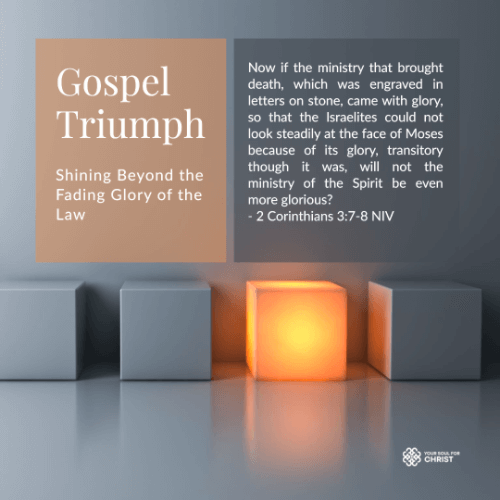Now if the ministry that brought death, which was engraved in letters on stone, came with glory, so that the Israelites could not look steadily at the face of Moses because of its glory, transitory though it was, will not the ministry of the Spirit be even more glorious?
2 Corinthians 3:7-8 NIV
The Law, given to the Israelites through Moses, was a set of rules and regulations that showed them how to avoid God’s judgement and punishment. However, it did not make them right with God, but only revealed their sinfulness and need for a Saviour. Whenever anyone broke any of the Law, they became guilty of all and unfit to come into God’s presence. Otherwise, such person would bring judgement upon himself. Therefore, the Law is called “the ministry of death” in 2 Corinthians 3:7, because it leads to spiritual and sometimes physical death for those who disobey it. Nadab and Abihu offered unauthorized fire and fire consumed them and they died. (Leviticus 10:1-2)
Nevertheless, the Law had some glory. When Moses received the Law from God on Mount Sinai, his face shone with God’s glory so brightly that the people could not look at him directly. He had to cover his face with a veil whenever he spoke to them. But this glory was temporary and fading. It did not last beyond Moses’ lifetime. When he died, the glory was gone.
The gospel of Jesus Christ, on the other hand, brings righteousness. It offers eternal life to all who repent and believe in Jesus Christ as their Lord and Saviour. The gospel is based on God’s grace and mercy, not on human works and efforts. It is eternal, not temporary, and therefore it has a far more exceeding and lasting glory. The gospel is called “the ministry of the Spirit” in 2 Corinthians 3:8, because it is empowered by the Holy Spirit who lives in every believer and transforms them into the image of Christ.
Likewise, the gospel removes the veil that covers the minds and hearts of those who are under the Law. The veil prevents them from seeing the truth and the beauty of God’s grace. It makes them blind and hard-hearted. But when anyone turn to Christ, He removes the veil. Consequently, he can see the glory of God in the face of Christ. They can also reflect that glory to others as they live by the Spirit.
The apostle Paul summarizes the contrast between the Law and the gospel in 2 Corinthians 3:9-11:
“For if the ministry that brings condemnation [the old covenant, the Law] has glory, how much more does glory overflow in the ministry that brings righteousness [the new covenant which declares believers free of guilt and sets them apart for God’s special purpose] Indeed, what had glory [the Law], in this case no longer has glory because of the glory that surpasses it [the gospel]5. For if that [Law] which fades away came with glory, how much more must that [gospel] which remains and is permanent abide in glory and splendour!”
2 Corinthians 3:9-11 AMP
So, we can see that the Law and the gospel are two different ministries that have different effects on people. The Law brings death, condemnation, and fading glory. The gospel brings life, righteousness, and surpassing glory. The Law shows us our sin and our need for a Saviour. The gospel shows us God’s love and His provision of a Saviour. The Law puts a veil over our minds and hearts. The gospel removes the veil and reveals the glory of God in Christ. The Law is temporary and obsolete. The gospel is eternal and relevant.
Since we have such a [glorious] hope and confident expectation, we speak with great courage, and we are not like Moses, who used to put a veil over his face so that the Israelites would not gaze at the end of the glory which was fading away. But [in fact] their minds were hardened [for they had lost the ability to understand]; for until this very day at the reading of the old covenant the same veil remains unlifted, because it is removed [only] in Christ.
2 Corinthians 3:12-14 AMP
Let us therefore embrace the gospel with gratitude and joy and share it with others with courage and confidence.
